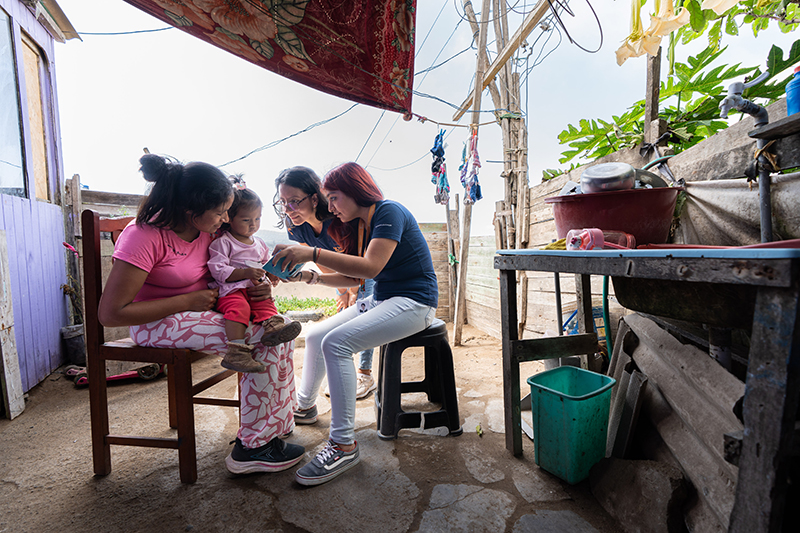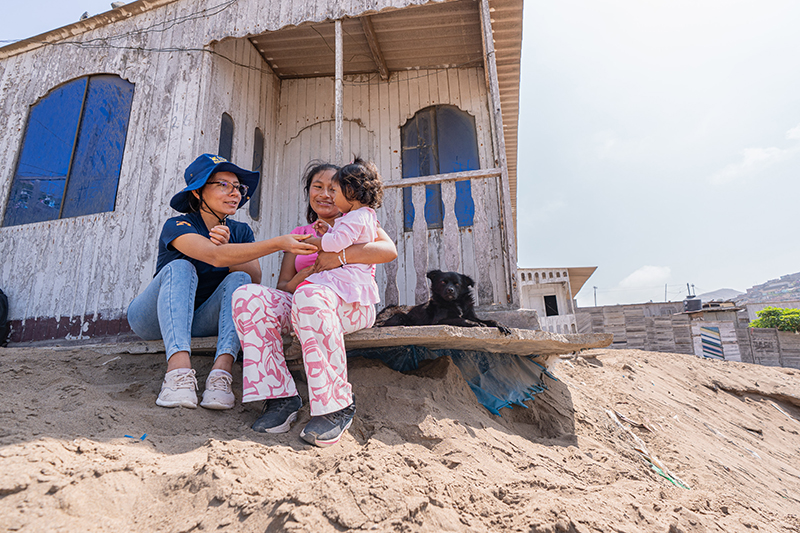Strengthening the Bond Between Caregivers and Children in Peru
Through CASITA, mothers like Dina Bustilles rediscover parenting through play, drawing, and support in the first steps of childhood development.
Posted on May 9, 2025

One afternoon, Dina Bustilles picked up a pencil and a blank sheet of paper. She began by drawing an apple. Then came a cow, a dog, a carrot. Thus, between lines and colors, she filled the pages of a small album for her youngest daughter, barely one year and seven months old.
The assignment was given during one of the CASITA sessions, an intervention of the Maternal, Child, and Adolescent Health (SAMIA) program of Socios En Salud, as Partners In Health is known in Peru. CASITA’s objective is to reduce the risk of developmental delays in children aged 6 to 24 months. Each mother or caregiver was asked to create a notebook with pictures to strengthen the bond with their children.
“I was going to print the images, but it's expensive. It was better for me to draw and color them well,”Bustilles says, flipping through the laminated pages.
When her daughter turned one, Bustilles noticed she wasn't speaking. She mentioned this during one of her checkups at the Bahía Blanca Health Center in Ventanilla, and they recommended she visit Sembrando Juntos School, one of the spaces where Socios En Salud has implemented its early childhood development intervention. This is how they identified that her little girl was at risk for social and language delays.
“She likes going. Me too, it's given me more experience [as a mother],” says Bustilles.
Although she doesn't speak yet, her daughter pauses at every page of the album. She stares in wonder, points to the figures, and smiles. In her own way, she communicates. And for her mother, who lives with the anxiety of this prolonged silence, seeing her react like this is a relief. A small step. A way to regain hope.

Growing up with CASITA
Six years ago, Bustilles left Huánuco to start a new life in Lima. Her husband, who works far away most of the time, told her he had bought a plot of land in Ciudad Pachacútec, in Ventanilla, a district north of Callao, and asked her to move there with him. Since then, she has lived with her two daughters on a hilltop, in a wooden house overlooking the sea.
Getting around from there isn't easy. To get to the market, she has to go down a dirt slope, walk to the road, and take a motorcycle taxi. She makes a similar journey, about half an hour long, every week to attend the CASITA project sessions with her younger daughter, while her 6-year-old daughter is cared for by a neighbor.
“It's hard being a mom,” she admits. “I make time to take her (to CASITA), but sometimes there's no car, no motorcycles …”
Caring for two girls alone is a demanding task. Her day begins at five in the morning and ends at dusk, amidst household chores. But on Wednesdays, at three in the afternoon, that effort finds a clear purpose: watching her youngest daughter play, laugh, paint, and build with blocks.
“I like it, it makes me much happier,” says Bustilles.
Since 2013, this SAMIA program intervention has successfully reversed the risk or developmental delay in 70% of participating children, especially in areas such as language, motor skills, and coordination. But the progress isn't limited to those who crawl or play.
For many mothers and caregivers, like Bustilles, the sessions also become a space for listening, trust, and support from community health workers, who are attentive to their care and visit them at home if they miss more than two sessions. There, they can share their concerns, discuss their difficulties, and feel supported.
“At first, when they just begin the sessions, many mothers don't play or sing with their babies, but later on, they warm up, share with each other, celebrate their children's achievements, and make the most of each session,” says Verónica Mondragón, a community health worker for the program.
“I believe that community support strengthens the relationship between mothers and their children because it gives them emotional security,” explains Heidi Damián, a CASITA project technician. “The trainings and individual support we offer allow caregivers to develop skills to effectively care for and educate their children. During each visit, we also identify cases that require additional support—emotional, social, or psychological—and activate the necessary networks. Because providing support is providing health.”
This is how mothers strengthen their bonds with their daughters and sons, learning to interpret their signals, respond with greater confidence, and celebrate each new gesture, word, or look as a step forward.

A motherhood that flourishes
Bustilles admits she's not a particularly affectionate mother. She believes it has to do with her own upbringing, in a home where her father didn't usually show affection. Even so, she strives every day to raise her children differently. She does this with small but consistent gestures: coloring in a notebook, walking with her daughter in tow, and showing up punctually for every CASITA session.
"I want them to be professionals in the future, to study. I want them to be better than me," she says.
Outside her house, a striking daffodil, a rue, and papaya leaves bloom. It's the only house in the area with plants. Bustilles patiently tends them. It's a small garden that not only beautifies the space but also reflects her desire to create, with what she has, a warm environment for her girls.
Like her plants, her motherhood grows silently. It's a form of care that isn't always visible, but it takes root. Because, as she herself has learned, growth also flourishes when there's someone there to support it.

